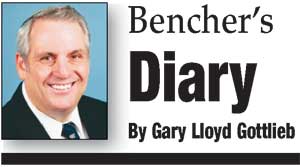The day is short, the task is great... It is not up to you to complete the work, Yet you are not free to desist from it…- Ethics of the Fathers, 2:20-21

This is my fourth bencher term, and it is only natural to wonder whether the years devoted to the task have been worthwhile. I remember the talk I had with the outgoing treasurer on the first day I spent at Osgoode Hall.
After asking me what I hoped to accomplish and receiving my reply, he looked me squarely in the face and said, “Gary, take it from me. It’s a hopeless task.”
“Maybe uphill, but not hopeless,” I thought to myself. I also thought too many days at Osgoode Hall had turned him into a cynic.
I never had any illusions about making radical changes, no matter how welcome those changes would be to lawyers in the trenches, for changing the status quo is not an easy task. As I observed in the first bencher’s diary I ever wrote (Law Times, June 5 – June 11, 1995), “My greatest fear is that progress . . . will be incremental rather that substantial.”
In many areas, that has proved to be the case. Our profession is regulated more than ever, the rules of professional conduct and the commentary to them grow ever thicker, and money continues to be poured into audits, investigation, and discipline with no surcease in sight.
Yet as I look back, some changes for the better have been made, and I like to think I played some small part in their achievement.
I never relished completing the members annual report, even when it became electronic, and each year found a glitch, or two or three, which I dutifully reported. I even wrote a column about it (“The formidable MAR: the mother of all Law Society forms,” Law Times, Nov. 20, 2006).
This year, wonder of wonders, I was able to complete it without a hitch and sent an e-letter to Terry Knott at the society with my congratulations.
Many was the day I said, in opposing mandatory continuing legal education, that all we had to do was make CLE affordable, accessible, and relevant, and lawyers would come flocking. To a great extent that has happened.
Law Society CLE programs are now outstanding and provide much more practical knowledge than they did years ago.
As for accessibility, the society, through innovation, has made CLE more accessible than ever before. Not only do we have live programs in various venues, but we have the interactive learning network and teleseminars. And you can purchase CLE materials and watch or listen to program replays on the internet.
Although LSUC CLE costs far less than what would be charged by a commercial provider, and although lawyers with annual incomes below $35,000 can qualify for a 50 per cent reduction off the regular price of most LSUC programs and publications, I still regret that there is not one low annual fee for which lawyers would be able to attend or otherwise access as much LSUC CLE as they wish.
Pressure from the Ontario Bar Association, which relies heavily on CLE revenue, is the biggest obstacle to having one low annual fee. At the very least, the current income threshold to qualify for a LSUC CLE programs and publications reduction should be increased.
There are also many practice resources on the law society web site. There are a best practices self-assessment tool, various practice guides, practice management guidelines, and a knowledge tree that provides answers to the most commonly asked questions in practice management areas.
LSUC CLE and member resources are particularly helpful to sole practitioners and small law firms, as are the monthly e-bulletins the law society sends out, and the practice tips that appear in each issue of the Ontario Reports. The society’s Ontario Lawyers Gazette is informative and interesting.
When I first became a bencher, sole practitioners and small law firms got little respect at Osgoode Hall. Now, especially after the work of the Sole Practitioner and Small Firm Task Force, there is recognition that we are integral to the provision of legal services to the ordinary public.
So I can truthfully say that progress has been made over the last 13 years, but there is still much to be accomplished. To borrow a line from Robert Frost (Stopping by the Woods on a Snowy Evening), “I have promises to keep and miles to go before I sleep.”
Gary Lloyd Gottlieb, a Toronto lawyer, is a Law Society of Upper Canada bencher and a Toronto sole practitioner. His e-mail address is [email protected]

 This is my fourth bencher term, and it is only natural to wonder whether the years devoted to the task have been worthwhile. I remember the talk I had with the outgoing treasurer on the first day I spent at Osgoode Hall.
This is my fourth bencher term, and it is only natural to wonder whether the years devoted to the task have been worthwhile. I remember the talk I had with the outgoing treasurer on the first day I spent at Osgoode Hall.